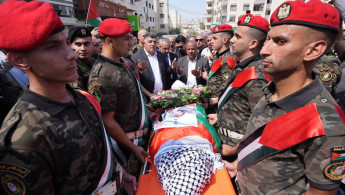Long journey home begins for body of slain American activist Aysenur Eygi from West Bank to Turkey
Turkey says it is working to repatriate the body of Ayşenur Ezgi Eygi, a Turkish-American activist who was fatally shot by Israeli forces in the West Bank last Friday.
Turkish Foreign Ministry spokesperson Öncü Keçethat said the mission to return the victim's body to the US from the West Bank had been complicated by Israel's closing of land crossings into Jordan, following the killing of three Israeli guards at the King Hussein Bridge crossing on Sunday.
Eygi, a human rights activist, was shot dead, reportedly by an Israeli sniper, during a peaceful protest close to a West Bank settlement, sparking anger in Turkey.
Turkish officials say they are exploring alternate routes to transport Eygi’s body back to her home country, due to the border closures.
"Land crossings from Palestine to Jordan were shut down by Israel as of yesterday. Upon her family’s request, we are working on the option of bringing the body directly to Türkiye by plane to avoid further delays," Keçeli said in a post on X.
The ambassador added that the Turkish consulate in Jerusalem is liaising with Palestinian authorities to expedite the process, while the Turkish consulate in Los Angeles is assisting Eygi’s family in arranging their trip to Turkey.
Palestinians in the occupied West Bank will hold a funeral procession for Eygi on Monday with a military cortege escorting her body from Rafidia Hospital in the West Bank city of Nablus, where the official procedure to transfer her remains will commence.
Eygi suffered serious injuries after being shot in the head by Israeli forces during a demonstration near Beita in the north of the West Bank. She was rushed to a hospital in nearby Nablus but died from her wounds shortly after arriving at the facility.
On Sunday, witnesses told Israeli news publication Haaretz that Israeli troops shot Eygi without provocation, as there were no clashes in the area at the time of the incident.
Although the Israeli military claimed that "the troops responded by shooting at a key instigator who had been throwing stones at the forces", people at the scene disputed this account.
They argued that the soldiers were in a position where they could clearly see that Eygi posed no threat to any of them.
"We thought that the demonstration was pretty much over because nothing was happening," US activist Vivi told Haaretz.
"First we heard a shot and it hit a dumpster that two volunteers were sitting behind and then there was a shot that hit Aysenur in the head".
Activists have asserted that Eygi had not thrown any stones or confronted any soldiers during the protest and the situation was calm when she was shot.
They also emphasised that, even if stones had been thrown, the soldiers were too far away to be hit.
"I was immediately just so shocked when I saw her laying on the ground, not moving," Vivi said.
"It was a direct shot to the head, it was not an accident. She was being extra safe out of all of the volunteers, she and her friends were standing the furthest back, in the safest spot that we thought."
Vivi also stated that "they would have known that she was an international volunteer because she is a woman and she was standing with other foreign volunteers".
Turkey's President Recep Tayyip Erdogan on Friday strongly condemned what he referred to as "Israel's barbaric intervention" resulting in the death of Eygi.
"I condemn Israel's barbaric intervention against a demonstration against the occupation in the West Bank and I pray for God's mercy for our citizen Aysenur Ezgi Eygi, who lost her life in the attack," he wrote on X.
Ayşenur Ezgi Eygi, in her mid-20s, was in Beita participating in a weekly protest against Israeli settlements in the West Bank.
The incident took place as Israeli forces were withdrawing from a deadly 10-day raid in the West Bank city of Jenin, amid the ongoing war on Gaza, which has killed near 41,ooo people.





 Follow the Middle East's top stories in English at The New Arab on Google News
Follow the Middle East's top stories in English at The New Arab on Google News


